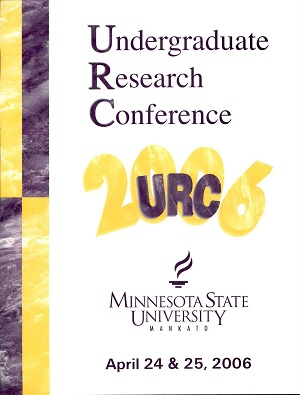Effects of Cryo-Destruction on 11β-Hydroxysteroid Dehydrogenase Expression in Hypertensive Rats
Location
CSU North Ballroom
Start Date
25-4-2006 10:00 AM
End Date
25-4-2006 12:00 PM
Student's Major
Chemistry and Geology
Student's College
Science, Engineering and Technology
Mentor's Name
Theresa Salerno
Mentor's Department
Chemistry and Geology
Mentor's College
Science, Engineering and Technology
Second Mentor's Name
Penny Knoblich
Second Mentor's Department
Biological Sciences
Second Mentor's College
Science, Engineering and Technology
Description
11 beta hydroxysteroid dehydrogenase (llβHSD) is an enzyme that converts cortisol to cortisone.There are two isoforms of these enzymes (11βHSD 1 and 2). 11βHSD 2 preserves aldosterone specificity on the nonselective mineralocorticoid receptor by inactivating glucocorticoids locally. The partial or complete inhibition of the enzyme results in hypertension and hypokalemia due to over stimulation of the mineralocorticoid receptor by cortisol which circulates in much higher levels than aldosterone. The purpose of my research project was to study the expression of 11βHSD 2 in the kidney of hypertensive rats who have had their adrenal cortex organs frozen. Previous work has shown that this decreases aldosterone levels. The effect on cortisone levels is unknown. The study examined whether the 11βHSD 2 was expressed in the hypertensive rats and whether the cyrodestruction affected its expression. The expression of both 11 beta hydroxysteroid dehydrogenase isoforms was measured semi-quantitatively by first isolating total RNA from control and experimental rat kidneys. Next, cDNA was made from the total mRNA using oligo dT primers,and the cDNA was amplified specifically with primers designed for each of the two RNAs. The DNA pieces were sized by gel electrophoresis and quantitated using densitometry. The differences in HSD-2 RNA expression was normalized against the HSD 1 values. A comparison of HSD-2 RNA levels in the control kidneys versus those undergoing cryodestruction was made. The results and conclusions will be discussed.
Effects of Cryo-Destruction on 11β-Hydroxysteroid Dehydrogenase Expression in Hypertensive Rats
CSU North Ballroom
11 beta hydroxysteroid dehydrogenase (llβHSD) is an enzyme that converts cortisol to cortisone.There are two isoforms of these enzymes (11βHSD 1 and 2). 11βHSD 2 preserves aldosterone specificity on the nonselective mineralocorticoid receptor by inactivating glucocorticoids locally. The partial or complete inhibition of the enzyme results in hypertension and hypokalemia due to over stimulation of the mineralocorticoid receptor by cortisol which circulates in much higher levels than aldosterone. The purpose of my research project was to study the expression of 11βHSD 2 in the kidney of hypertensive rats who have had their adrenal cortex organs frozen. Previous work has shown that this decreases aldosterone levels. The effect on cortisone levels is unknown. The study examined whether the 11βHSD 2 was expressed in the hypertensive rats and whether the cyrodestruction affected its expression. The expression of both 11 beta hydroxysteroid dehydrogenase isoforms was measured semi-quantitatively by first isolating total RNA from control and experimental rat kidneys. Next, cDNA was made from the total mRNA using oligo dT primers,and the cDNA was amplified specifically with primers designed for each of the two RNAs. The DNA pieces were sized by gel electrophoresis and quantitated using densitometry. The differences in HSD-2 RNA expression was normalized against the HSD 1 values. A comparison of HSD-2 RNA levels in the control kidneys versus those undergoing cryodestruction was made. The results and conclusions will be discussed.
Recommended Citation
Udomah, Eminimoh. "Effects of Cryo-Destruction on 11β-Hydroxysteroid Dehydrogenase Expression in Hypertensive Rats." Undergraduate Research Symposium, Mankato, MN, April 25, 2006.
https://cornerstone.lib.mnsu.edu/urs/2006/poster-session-E/2




